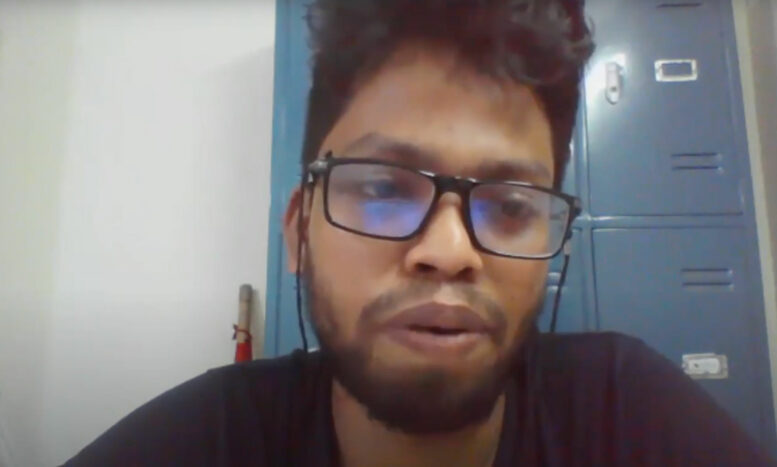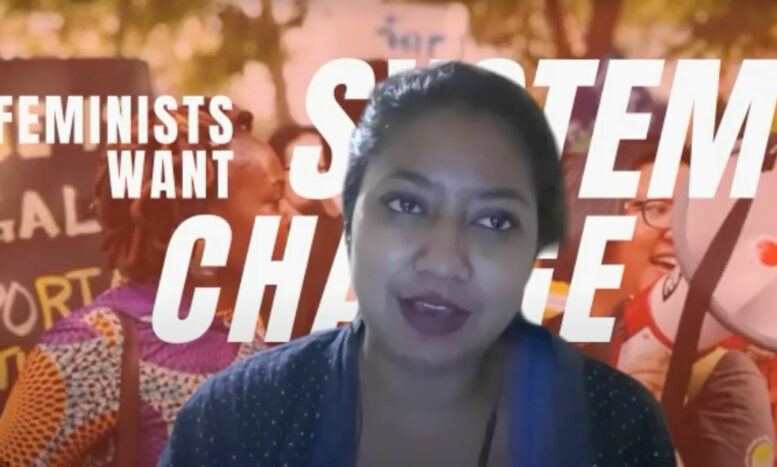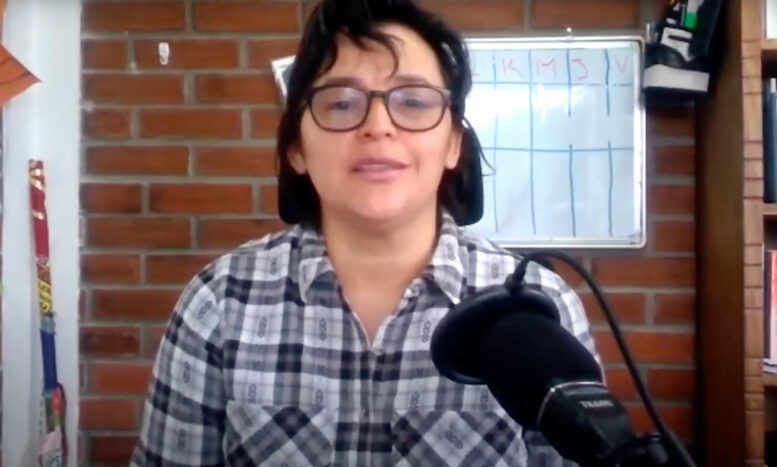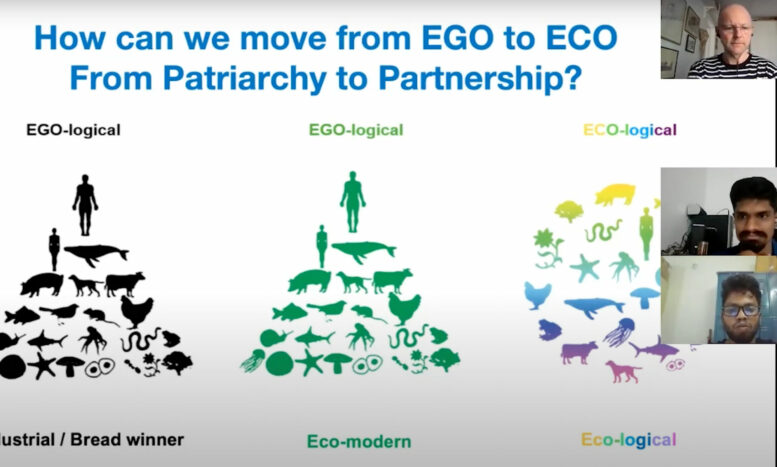Discussing Climate Justice and Masculinities at CSW66
Together with members and partners, MenEngage Alliance participated in the 66th session of the Commission on the Status of Women (CSW66) from 14 to 25 March 2022. This year’s priority theme explored the links between gender and climate justice. In this article, Dani Nieto Perafán (she/her) from the MenEngage Global Secretariat summarizes the two virtual events co-organized by the MenEngage Alliance Working Group on Climate Justice. The events; organized alongside feminist, indigenous, and youth climate justice partners as part of CSW66; explored the links between the climate crisis and patriarchy. The panelists involved looked at how work to transform patriarchal masculinities fits into the urgent work needed for gender and climate justice.
“Changes in the [climate] have grown more salient, including increasing global temperatures, loss of ice volume, rising sea levels and changes in global precipitation patterns.” These words, shared by The Intergovernmental Panel on Climate Change (IPCC), make it clear that the climate and environmental crisis will have far-reaching consequences for all people, especially those living on the margins because of systemic injustices around gender, sexuality, socio-economic status, class, health, race, geographical location, and many other intersecting factors.
It is now well-understood that the climate crisis increases these existing inequalities. For example, following natural disasters, families of low income that might not have the financial means to rebuild their homes are at the greatest risk of being forced to leave their homes and communities as climate refugees.
According to the United Nations, many existing gender inequalities and injustices will be exacerbated by the climate crisis. For instance, young displaced women will be more at risk of being trafficked. Similarly, young women and girls are at greater risk of early and forced marriages in communities facing extreme pressures brought on by the instability of climate change, fuelling existing patriarchal patterns.
This year’s Commission on the Status of Women (CSW66) aimed to put the spotlight on these and the many other ways the climate crisis is gendered. With the official priority theme of “achieving gender equality and the empowerment of all women and girls in the context of climate change, environmental and disaster risk reduction policies and programmes,” CSW66 consisted of two-weeks of high-level discussion and a host of virtual side events. In addition, NGO CSW organized its usual parallel program led by civil society.
In recent years, MenEngage Alliance has aspired to become more active in the climate justice movement. This has meant centering climate justice as a priority theme, as well as developing partnerships with feminist climate justice movements. That is why the MenEngage Environmental and Climate Justice Working Group worked together with key partners to shape two events linked to CSW66. As with all MenEngage events, the specific focus was bringing a critical ‘men and masculinities’ lens to the topics at hand.
Specifically, the two events organized by the Climate Justice Working Group, explored and unpacked how patriarchal masculinities are linked to the climate crisis. This was part of a host of events co-organized by members and partners of MenEngage Alliance as part of CSW66. Click here for more information on those events.
Speakers from MenEngage Alliance working on environmental and gender issues were joined by leading feminist and youth climate activists and political voices for the discussions. They shared insights on how the work to transform patriarchal masculinities is a key component in challenging and transforming the harmful systems that underpin the climate crisis, gender justice, and other social injustices.
Patriarchy and Climate Change

As explained by Sohanur Rahman, of Fridays for Future Bangladesh, in the side event (Climate Justice as Gender Justice: Making the case to address Masculinities and Patriarchy in Climate Change), the “climate crisis is the symptom and the result of colonialism, the domination of men, and capitalism. So we cannot achieve climate justice without gender justice.”
Sohanur’s insights speak to the ways in which the climate crisis is fueled by patriarchal masculine norms that value dominance, control, and consumption over traits such as cooperation, compassion and care for the environment. These masculine norms exist within, and are part of, unsustainable economic systems and the ongoing impacts of colonialism.
An example of these colonial impacts, presented by Sanam Amin, of the GEF Climate Nexus, is how the fossil fuel industry continues to profit from the extraction infrastructure built through systems of colonization – led by powerful corporations with the backing of European states and militaries. The historic foundations for climate change were laid by these patriarchal, euro-centric, militaristic, and colonial systems.

As Sanam explained, “patriarchy as a structure cooperates with capitalism, which is extractive, is exploitative, tries to just gain profit over and over, and accumulates it as much as possible.” Sanam went on to discuss how patriarchal systems exploit the labor of women and gender minorities.
This predominantly-female labor is ignored in the dominant measures of countries’ economies. Yet the COVID-19 pandemic highlighted just how important care work (whether paid or unpaid) is for society. Clearly, as Sanam shared, care is not considered valuable to society in the ways other forms of work are.
Sanam continued with an example to demonstrate how the issues of care inequity and climate justice are linked: In Bangladesh coastal degradation and loss of land because of increased ocean salinity is leading to the loss of traditional livelihood in terms of agriculture. This has increased rates of poverty and, in many cases, forces people to leave their homes in search of a more secure livelihood. This increased pressure on families puts girls at increased risk of child marriage, with families more likely to arrange for their child’s marriage into another family – hoping to secure a more financially stable future for them while allieveiating financial pressure on their own households. This is one example of why it is important to emphasize social and gender justice in actions and discussions around climate change.

Meanwhile, in the Parallel Event (Transforming Patriarchal Masculinities for Women’s Rights, Gender, and Climate Justice), Daysi Flores, of JASS Associates, stated that “patriarchy allows us to see nature as a profit system. A system of profiteering that has installed privileges that we no longer even question, that we take for granted.” Discussing the concept of exploitation, Daysi highlighted the similarities between the impact of patriarchy on women and nature. Despite all the resistance and struggles of feminist movements, much like the climate justice movements, gender and climate justice have not been achieved. This is because injustice keeps being reinforced by the extraction model based on colonial rule. According to Daysi, this extraction model (exactly like patriarchy) depends on corruption, illegality, and impunity to function. Daysi cited the number of femicides in Latin America as an example of how impunity keeps the patriarchy functioning; meanwhile, extractive industries, alongside governments, use capitalism and corruption as a way to stay in power.
Patriarchal Masculinities and Climate Change

In each of the MenEngage events at CSW66, Vidar Vetterfalk, of MÄN Sweden, shared recent academic research on masculinities and the environment by Paul M. Pulé and Martin Hultman. The research has identified three broad patterns of the relationships between masculinities and the environment, and how they have shaped – and continue to shape – the ways men and boys relate to nature, the environment and climate change.
The first are the ‘ego-logical’ masculinities; these masculinities are industrial, they reinforce the gender norm of men being ‘bread-winners’ for their families. Ego-logical masculinities see men as separate from women and nature, they place men at the top of the pyramid, and seek to justify the exploitation and domination of women and nature. Vidar also stated how ego-logical masculinities have intersectional discrimination (some men are not on the top, and some women are placed even lower in the pyramid), the diagrams being a simplified way of illustrating the concept.
The middle pyramid in the diagram represents the ‘eco-modern’ way of thinking about masculinities. This is a pattern in which people acknowledge the climate crisis, but believe that finding solutions means just focusing on maintaining the same structures and relations in society and towards nature. It can be seen as a ‘business as usual’ approach based on the supposed solutions to the climate crisis that allow the continued extraction of resources and domination over the natural world. This can even include seemingly-useful technologies for renewable energy, electric cars and recycling. Whilst these solutions will be needed in some form for a sustainable future, they continue to fuel levels of consumption and extraction that are unsustainable. They can be seen as aligning with ‘eco-fascism’ – a trend in which rich nations and groups transition to sustainability while exacerbating profound social injustices. An example of this is human rights abuses relating to the mining conditions in the extraction of minerals needed for ‘green’ technologies like solar panels. Eco-modern masculinities completely fail to address the dominant and exploitative patriarchal gender norms that we see in the ‘ego-logical’ ways of thinking about masculinities. Vidar gave Sweden as an example: the government prides itself on being the first green democracy, but later installs wind turbines in lands that belong to indigenous people. Vidar called it “green colonialism”.
The third way of thinking about masculinities’ relations to nature, Vidar explained, has been framed by the researchers as ‘eco-logical’. This pattern goes beyond patriarchal masculinities and gender norms. As Vidar explained, “we are not separate from the ecosystem. We are part of it.” It is a pattern of thinking about gender and nature that we strive towards, without exploitation over people, other species, or the planet. In one the Parallel Event session, Vidar facilitated an exercise in which the participants had to discuss the following questions:
- In what ways are the ego-logics of industrial/bread-winner masculinities present in my organizational culture? And/or in my country?
- In what ways am I contributing to industrial/bread-winner masculinities in my personal life?

Furthermore, in the side event, Silas Ngayaboshya, from the Ministry of Gender and Family Promotion in Rwanda, explained that the patterns of consumption are deeply gendered. Women tend to have a smaller carbon footprint than men. He gave the example of meat eating, and how this is unsustainable for the environment and associated with masculinity. Therefore, “more traditional forms of masculinities are normally associated with less sustainable practices.” Silas also gave the example of how patriarchal norms associate economic dominance and command over nature with masculinity. In the context of farming, men may therefore feel they are expected to aggressively produce more; this has more likelihood of damaging the land and contributing to the disregard for nature. However he emphasized that men are not born evil pollutants or exploiters of natural resources. It is the gendered, patriarchal socialization that influences individual and collective norms and values relating to nature, the environment, and the climate crisis.

Because of these patriarchal gender norms that contribute to the climate crisis, a key way way to approach change is to unlearn and dismantle patriarchal norms with solidarity and allyship for the feminist systems change agenda. According to Lotta Sylwander, from Sida, in the side event, “we need to engage with men in a different way. We need to allow them opportunities to reconnect with nature, with caring, with being fathers.” This kind of individual-level change, when part of broader efforts towards structural change, are crucial for a climate and gender-just world.
Panelists for the parallel event held on Tuesday, 15th of March 2022:
- Daysi Flores (from JASS, Honduras),
- Kayinga Muddu Yisito (from COTFONE, Uganda & MenEngage Global Working Group for Climate Justice),
- Aniket Wakankar (from The Gender Lab, India & MenEngage Global Working Group for Climate Justice),
- Sohanur Rahman (from YouthNet for Climate Justice; Fridays for Future, Bangladesh; & MenEngage Global Working Group for Climate Justice),
- and Vidar Vetterfalk (from MÄN, Sweden & MenEngage Global Working Group for Climate Justice)
Panelists for the side event held on Friday, 18th of March 2022:
- Sanam Amin (from the Action Nexus on Feminist Economic Justice for People and Planet in the Generation Equality Forum),
- Silas Ngayaboshya (Director-General of Gender Promotion and Women Empowerment at the Ministry of Gender and Family Promotion, Rwanda),
- Sohanur Rahman (from YouthNet for Climate Justice; Fridays for Future, Bangladesh; & MenEngage Global Working Group for Climate Justice),
- Lotta Sylwander (Lead Policy Specialist Gender at Sida, Sweden),
- and Vidar Vetterfalk (from MÄN, Sweden & MenEngage Global Working Group for Climate Justice)
Dani Nieto Perafán wrote this article as communications and social media intern with MenEngage Alliance Global Secretariat.
